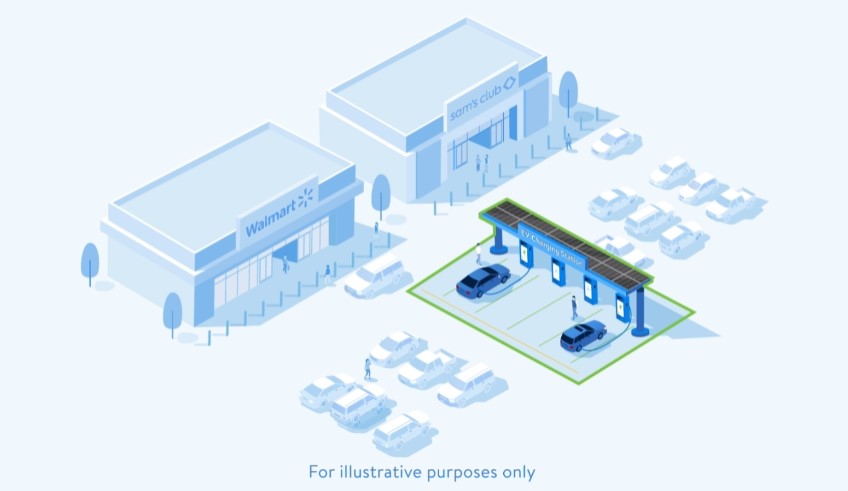Welcome to the latest edition of the EV Universe Electric Newsletter #015, your go-to source for all things electric vehicles!
In each edition, we take a closer look at the exciting developments in the EV world and dive into the latest news and trends shaping the industry. From the latest makes and models to advancements in electrification, to innovative accessories and technologies, we’ve got you covered.
Join us on this journey. Let’s explore the future of sustainable transportation and its electrifying impact on our world. In this edition, we are covering the Walmart & Sam’s Club plan thousands of EV fast-charging stations, Kia unveils impressive US-built electric SUV, and Tesla faces privacy concerns over sensitive customer car data.
“Walmart and Sam’s Club to Build Thousands of EV Fast-Charging Stations by 2030“
- Walmart and Sam’s Club will build thousands of EV fast-charging stations by 2030. Walmart and Sam’s Club plan to build their own fast-charging network at thousands of locations across the US by 2030, in addition to the almost 1,300 EV fast-charging stations already available at over 280 facilities.
- The chargers will be conveniently located and affordable. With a store or club located within 10 miles of approximately 90% of Americans, Walmart and Sam’s Club will provide a convenient charging option that will help make EV ownership more accessible, reliable, convenient, and affordable for people who live in rural, suburban, or urban areas. Moreover, chargers will be located on-site with Supercenters, Neighborhood Markets, and Sam’s Clubs, offering customers and members the convenience of being able to pick up essentials for their families or grab a bite to eat while they charge.
- The charging network will expand domestic EV charging capacity across states. As more drivers transition to EVs, Walmart and Sam’s Club’s network growth will help expand domestic EV charging capacity across states. The charging stations will offer easy access to on-the-go charging, which is a game-changer for drivers who have been hesitant to purchase an EV for concerns they won’t be able to find a charger in a clean, bright, and safe location when needed.
- Walmart and Sam’s Club aim to help customers and members live better, easier, and more sustainable lives. Walmart and Sam’s Club see their commitment to providing convenient and affordable EV charging as a natural extension of their work to help customers and members live better, easier, and more sustainable lives. This marks the latest investment in their efforts to transform their business and product supply chains to be more regenerative, helping reduce emissions and increase efficiencies for customers.
- Walmart and Sam’s Club are committed to providing the services customers need and want. Walmart and Sam’s Club are committed to providing customers, members, associates, suppliers, and communities at large with the services they need and want, in a way that fits their lifestyle. They believe that making EV ownership easy and simple is no exception and that they are uniquely positioned to deliver a convenient charging option that will help make EV ownership possible for everyone.
“2024 Kia EV9: First US-built Kia Electric SUV with Impressive Range and Towing Capacity”
- First Kia EV to be built in the US. The 2024 Kia EV9 is expected to be built in West Point, Georgia, starting in 2024, making it the first Kia EV to be assembled in the US, allowing it to qualify for US federal tax credits. The production in the US will make it easier for the company to supply its electric SUVs to the North American market while cutting down on shipping costs and reducing carbon emissions.
- Two battery options with impressive charging speed. The Kia EV9 will offer two battery choices in the US. Customers can choose between a 76.1-kilowatt-hour battery with a 160-kilowatt motor driving the rear wheels or a larger 99.8-kWh battery pack, which comes in either single- or dual-motor configurations. The 800-volt electrical architecture of the EV9 allows for a maximum DC fast charging speed of 230 kW, which will enable a fast charging time of under 25 minutes from 10 to 80 percent state of charge. The 11 kW onboard charger will allow for Level 2 charging.
- Generous space and towing capacity. The Kia EV9 is a three-row electric SUV that offers ample space for passengers and luggage. With all three rows raised, the EV9 can accommodate 20.2 cubic feet of cargo space, which increases to 81.9 cubic feet when both rows of rear seats are folded. Additionally, the cargo area features a V2L outlet that can power tailgating parties or other outdoor activities. The EV9 also offers up to 5,000 pounds of towing capacity, making it suitable for hauling small trailers.
- Drive modes and torque-vectoring all-wheel drive. The EV9 offers four drive modes at launch: Eco, Normal, Sport, and My Mode. Eco mode maximizes range by limiting power output, while Sport mode increases power output for a more dynamic driving experience. The EV9 AWD features torque-vectoring all-wheel drive, which enables it to transfer power to individual wheels, providing better handling and stability in a variety of driving conditions.
- Pricing and range ratings to be announced. While the specifications and features of the 2024 Kia EV9 have been unveiled, the company has not yet announced US pricing and EPA-rated range ratings. The pricing and range estimates are expected to be released ahead of the EV9’s arrival in the United States, which is set to happen in Q4 2023. The pricing information will be important for buyers who are considering purchasing the EV9, while the range ratings will determine the overall appeal of the vehicle, especially for long-distance drivers.
“Tesla Workers Shared Sensitive Images and Videos Recorded by Customer Cars Without Consent, Raising Concerns Over Privacy Risks“
- Tesla employees shared private recordings from customer cars without consent. Between 2019 and 2022, Tesla employees reportedly accessed and shared invasive videos and images recorded by customers’ car cameras through an internal messaging system. Some of these videos captured Tesla customers in embarrassing or vulnerable situations, such as a man being caught on camera approaching a vehicle completely naked. The incident raises concerns about privacy and the risks of collecting and storing personal data without proper safeguards in place.
- The incident highlights the potential privacy risks of collecting and storing personal data. Tesla’s use of cameras in its vehicles to assist with driving raises concerns about the potential risks of uncontrolled access to personal data by employees or other unauthorized parties. The incident involving Tesla workers underscores the need for robust safeguards to protect customer data, particularly as more cars become connected and autonomous.
- Tesla claims to have taken action to prevent future incidents. Following the incident, Tesla claims to have taken immediate action to prevent future incidents, including introducing new protocols and safeguards to restrict employee access to sensitive data. While the effectiveness of these measures remains to be seen, Tesla’s response suggests that the company recognizes the seriousness of the issue and is taking steps to address it.
- Sharing sensitive videos and images by employees is morally reprehensible, according to a data privacy expert. David Choffnes, executive director of the Cybersecurity and Privacy Institute at Northeastern University in Boston, called sharing sensitive videos and images by Tesla employees “morally reprehensible.” He noted that circulating sensitive and personal content could be construed as a violation of Tesla’s own privacy policy and result in regulatory intervention by the US Federal Trade Commission, which enforces federal laws relating to consumers’ privacy.
- Incidents like this could erode consumer trust in tech companies and result in regulatory intervention. The mishandling of personal data, such as the incident involving Tesla workers, can have serious consequences for consumer trust in tech companies. Breaches of privacy can damage brand reputation and erode customer confidence in the ability of companies to protect their personal information. As incidents like these continue to occur, regulatory intervention may be necessary to protect consumer privacy and ensure that companies are held accountable for safeguarding personal data.






